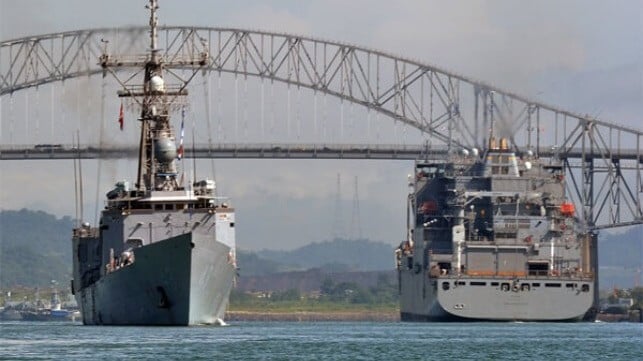Panama Canal Rejects Claims of Free Passage for U.S. Government Ships

The war of words between the United States, the government of Panama, and the Panama Canal Authority continues with officials in Panama saying they were “surprised” by the U.S. posting on X claiming “U.S. government vessels can now transit the Panama Canal without charge fees.” Later Panama’s president told reporters the statement was “based on a falsity and that’s intolerable.”
The U.S. State Department made the claim online after Secretary of State Marco Rubio met with officials of the Panamanian government and the Panama Canal Authority which was established in 1997 to independently operate the canal. Rubio reportedly carried a message from Donald Trump saying China’s influence and control of the operations of the Panama Canal were “unacceptable.”
The U.S. is asserting that China has taken control and that it is in violation of the treaty that led to the handover of the canal. Panama committed to maintaining the operation and neutrality of the Panama Canal.
The Board of the Panama Canal issued a brief statement after the meeting indicating its “willingness to hold the required technical talks.” It however highlighted its constitutional mandate over the operation of the canal and its responsibilities.
The U.S. asserted it would save millions of dollars per year without the fee for U.S. government vessels. Media reports said Panama was bending to U.S. demands while there were reports that the contract for the port operations awarded to China’s Hutchinson had also been placed under review. Panama has also said it would not continue to participate in China’s Belt and Road initiative.
“I completely reject that statement,” Panama President Jose Raul Mulino told reporters on Thursday during a weekly press conference referring to the waving of the transit fees. He asserts that they told Rubio that the government could neither set the fees nor exempt anyone as it was the sole responsibility of the board of the authority.
The Panama Canal Authority also issued a statement highlighting that it is authorized to set the tolls and fees. It asserted it has “not made any adjustments,” but that it was prepared to establish a dialogue with U.S. officials “regarding the transit of warships.”
The U.S. State Department is yet to respond to the statements from Panama. Trump earlier in the week said that Panama had “agreed to certain things,” eluding to progress to resolving the situation.
Reports from the canal authority vary on the fees paid by the U.S. and the number of U.S. vessels transiting the canal. Of the approximately 14,000 ships that transit the canal annually, approximately half are traveling to or from U.S. ports, but most are operating under foreign flags. Trump however asserts U.S. companies are being “ripped off” by the fees charged to ships transiting the canal.
The BBC cites data from the Panama Canal Authority saying the U.S. has paid $25.4 million in transit fees for warships over the past 26 years. Panama asserts that adds up to less than $1 million per year. Newsroom Panama analyzed the transit statistics and reports on average 38 U.S. warships transit the canal each year.
Chinese officials are continuing to reject the U.S. assertions. A Foreign Ministry spokesperson, Guo Jiakun, reiterated on Thursday China’s position that it has always respected Panama's sovereignty over the canal. Reporters were told China recognizes the canal as a permanently neutral international waterway.
Mulino posted on social media that he now has a call scheduled with Donald Trump for Friday. Ahead of that he also told reporters today that Panama’s ambassador in China has given the required 90-day notice to end Panama’s involvement in the Belt & Road program.
Experts note that the prior government of Panama had welcomed China’s involvement and investment in the port infrastructure. They predicted that the war of words is likely to continue.
